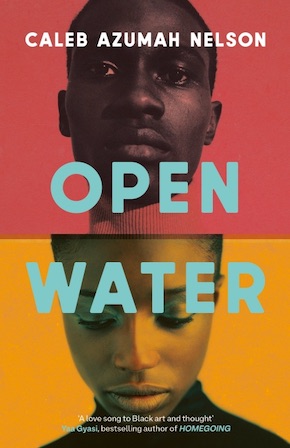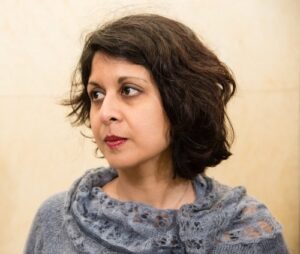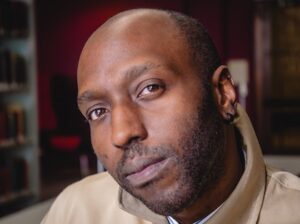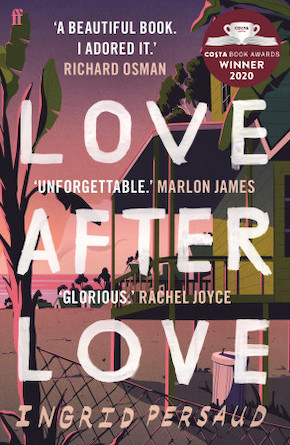New writers for the new normal
by Vahni Capildeo
“Open Water enchants even as it breaks your heart.” Kei Miller
Kei Miller’s list of Emerging Writers of an Emerging World for the 2021 International Literature Showcase fizzes with hope, like an old-timey musical. Spring is bustin’ out all over, and it’s named Caleb Azumah Nelson, Daisy Lafarge, Gail McConnell, Helen McClory, Ingrid Persaud, Jarred McGinnis, Mícheál McCann, Rachel Long, Sairish Hussain and Steven Lovatt. There is something for everyone: six novels, three volumes of poetry, and non-fiction. Two novels are family sagas which would make a book club happy. Another scratches the itch for horror. What qualities might these titles share – apart from being stunningly well written?
First, there is, yes, hope. These writers, fearless and uncensored, deal with hard topics: violent death, the loss of love between mother and child, the disappearance of beloved nature, the ravages of illness. Still, loss is not the lesson. Their courage opens many worlds. None is a pornographer of misery or a documentary consumer of otherness. They sweep us up on a high tide of creativity. We are carried by – emerging or no – the joy of the craft.
This craft is evident in how the sense of genre dissolves in the sense of pleasure or astonishment. “To love is both to swim and drown,” says the narrator of Caleb Azumah Nelson’s London novel Open Water, which reads like a lyric, looping through nervy dreams and dancing out trauma. Open Water asks both reader and story, “How are you feeling?” Poet Gail McConnell’s The Sun is Open deserves to be read by lovers of art and non-fiction too. The epigraph, from a newspaper, specifies McConnell’s father was “shot dead in front of his wife and three-year-old daughter” in Northern Ireland. Using typography and verbal collage, McConnell’s journey leads from the infant imagination, taking keep of bereavement, into redemptive queer parenthood.
Whether we are seen or not seen is a serious theme shared by Miller’s choices, which move easily between multiple perspectives. Rachel Long’s My Darling from the Lions is gorgeous with tangible details: incense, snow, wigs, crabs, dolls. In the fascinating variations on single, short poems, something as a visceral as a scream can be variously experienced and explained. The Acknowledgements portray a new writing world of connection and support: authors are not lone heroes. Daisy Lafarge’s novel Paul flows, perversely akin to a holiday read about sun-drenched France. However, its suspense is worthy of Hitchcock and du Maurier. With apocalyptic irony, the conditions that let Man who would be Genius flourish are exposed in the bright, dissociative voice of a younger woman, and in parallels between this Paul and Gauguin.
Why hasn’t it been normal for books like these to star in our shelves, curriculums and speeches? Can we reclaim the pandemic phrase ‘the new normal’ for what such writers establish in the realm of the imagination?”
Tender masculinity to the fore, toxic masculinity decentred: another common trait of Miller’s chosen titles. Mícheál McCann’s Safe Home breathes a pine forest of forgiveness and love while chronicling muddiness and pain. Like Lafarge’s novel, these poems are ecologically aware, prickling with the rural, urban and technological.
The big question is, why hasn’t it been normal for books like these to star in our shelves, curriculums and speeches? Where, as in Sairish Hussain’s Family Tree, the web of everyday life and sparky conversation, city amusements and temptations, just happens to foreground a Muslim family? Where, as in Jarred McGinnis’s The Coward, the protagonist happens to be a wheelchair user who is no ‘example’, but spirals through action adventure and the shattering machismo intertwined with romance, towards unpredictable conclusions? Can we reclaim the pandemic phrase ‘the new normal’ for what such writers establish in the realm of the imagination, where the actions that shape our reality begin?
Ingrid Persaud’s Love after Love is the most heartbreakingly realistic depiction of Trinidadian society since V.S. Naipaul’s A House for Mr Biswas. The ear for dialogue resembles Hussain; the family relations recall McGinnis; the burn of love and desire perhaps exceeds Long, McCann and Nelson (who do different things surpassingly well). Told by three different narrators in alternating sections, Persaud’s novel bears formal comparison with Scottish writer Helen McClory’s Bitterhall. McClory toys with modern British obsessions with period drama and the tracing of ancestry, creating a labyrinth of dark mirrors. Each character retells the ‘story’. It’s like The Turn of the Screw, but even more so. The language is graceful and extravagant, as if McClory channels the real or back-projected dead.
Steven Lovatt’s Birdsong in a Time of Silence corrects the ‘male bias’ of scientists and birdwatchers: ‘bird listening’ is as important as birdsong. This nature writing gently presents us with another genre-bender. The sentences (some five lines long) are stop-start and intricate, poetic as birdsong. Chronicling changes to the lockdown soundscape, Lovatt resituates our predicament as sharing in the precarity of the natural world. This is not an exercise. He writes out of passion. And this is the gift Kei Miller brings us: a catalogue of firmly grounded visionaries, writing with mind, heart and soul.
Commissioned by National Centre for Writing and British Council as part of the International Literature Showcase. Reproduced by permission
 Vahni Capildeo is a Trinidadian Scottish writer inspired by live Caribbean connections, an Indian diaspora background and natural landscapes. Among seven poetry books and four pamphlets, Measures of Expatriation (Carcanet Press, 2016) was awarded the Forward Prize for Best Collection. Following a DPhil in Old Norse literature, Capildeo has worked in academia; in culture for development, with Commonwealth Writers; and as an Oxford English Dictionary lexicographer. Currently Writer-in-Residence at the University of York, past posts include the Judith E. Wilson Poetry Fellowship and Harper-Wood Studentship at Cambridge, a Douglas Caster Cultural Fellowship at the University of Leeds, a Seamus Heaney Centre Fellow at Queen’s University Belfast, and a UNESCO Poetry Fellowship at the University of East Anglia. Capildeo’s new poetry collection Like a Tree Walking is published in November 2021 by Carcanet Press.
Vahni Capildeo is a Trinidadian Scottish writer inspired by live Caribbean connections, an Indian diaspora background and natural landscapes. Among seven poetry books and four pamphlets, Measures of Expatriation (Carcanet Press, 2016) was awarded the Forward Prize for Best Collection. Following a DPhil in Old Norse literature, Capildeo has worked in academia; in culture for development, with Commonwealth Writers; and as an Oxford English Dictionary lexicographer. Currently Writer-in-Residence at the University of York, past posts include the Judith E. Wilson Poetry Fellowship and Harper-Wood Studentship at Cambridge, a Douglas Caster Cultural Fellowship at the University of Leeds, a Seamus Heaney Centre Fellow at Queen’s University Belfast, and a UNESCO Poetry Fellowship at the University of East Anglia. Capildeo’s new poetry collection Like a Tree Walking is published in November 2021 by Carcanet Press.
york.ac.uk
carcanet.co.uk
@VCapildeo
Author portrait © Adrian Pope
 Kei Miller was born in Jamaica in 1978 and has written several books across a range of genres. His poetry collection The Cartographer Tries to Map a Way to Zion (Carcanet Press, 2014) won the Forward Prize for Best Collection, and his novel Augustown (Weindenfeld & Nicolson, 2016) won the Bocas Prize for Caribbean Literature, the Prix Les Afriques, and the Prix Carbet de la Caraïbe et du Tout-Monde. His latest book is the essay collection Things I Have Withheld (Canongate, 2021). He has an MA in Creative Writing from Manchester Metropolitan University and a PhD in English Literature from the University of Glasgow, and has taught at the Universities of Glasgow, Royal Holloway and Exeter. He was the 2019 Ida Beam Distinguished Visiting Professor to the University of Iowa and is a Fellow of the Royal Society of Literature.
Kei Miller was born in Jamaica in 1978 and has written several books across a range of genres. His poetry collection The Cartographer Tries to Map a Way to Zion (Carcanet Press, 2014) won the Forward Prize for Best Collection, and his novel Augustown (Weindenfeld & Nicolson, 2016) won the Bocas Prize for Caribbean Literature, the Prix Les Afriques, and the Prix Carbet de la Caraïbe et du Tout-Monde. His latest book is the essay collection Things I Have Withheld (Canongate, 2021). He has an MA in Creative Writing from Manchester Metropolitan University and a PhD in English Literature from the University of Glasgow, and has taught at the Universities of Glasgow, Royal Holloway and Exeter. He was the 2019 Ida Beam Distinguished Visiting Professor to the University of Iowa and is a Fellow of the Royal Society of Literature.
underthesaltireflag.com
@keimiller
Author portrait © Christine Fourie
 The International Literature Showcase has highlighted great UK-based writers and facilitated collaboration and exchange for over eight years. The 2021 selection of 50 writers working in the UK, the culmination of a two-year project between the National Centre for Writing and the British Council to bring outstanding UK writing talent to new global audience, was curated by Elif Shafak, Jackie Kay, Kei Miller, Owen Sheers and Val McDermid.
The International Literature Showcase has highlighted great UK-based writers and facilitated collaboration and exchange for over eight years. The 2021 selection of 50 writers working in the UK, the culmination of a two-year project between the National Centre for Writing and the British Council to bring outstanding UK writing talent to new global audience, was curated by Elif Shafak, Jackie Kay, Kei Miller, Owen Sheers and Val McDermid.
Read more
@WritersCentre
@LitBritish


